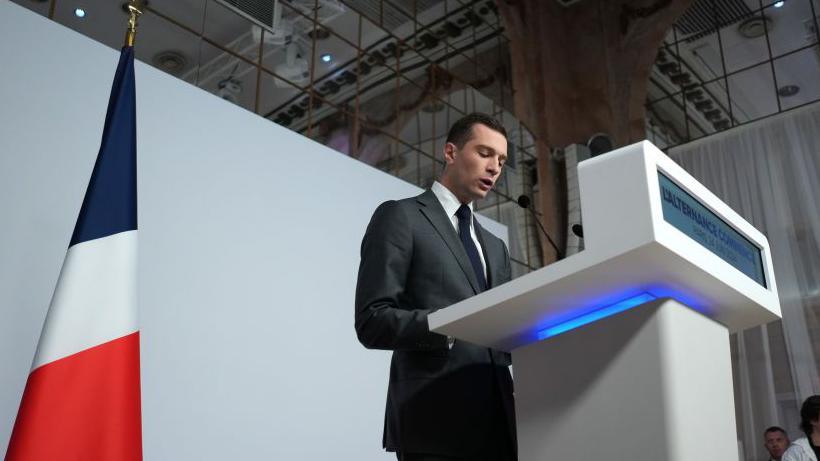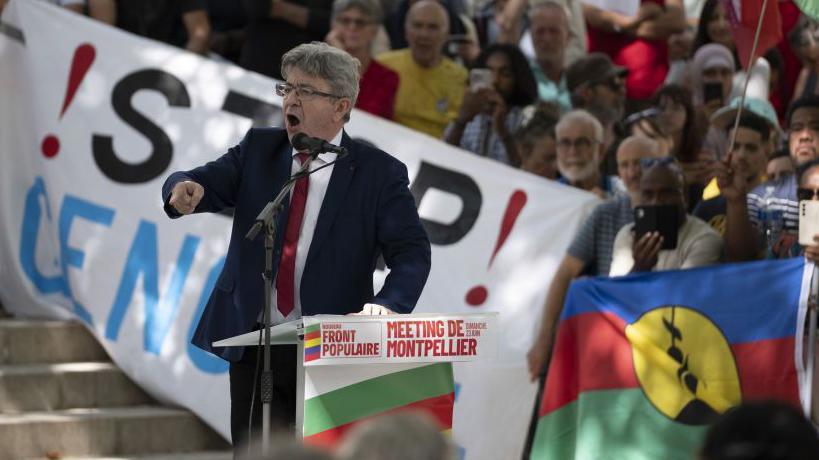French far-right 'ready' to rule and fight immigration

A National Rally victory could see Jordan Bardella as France's next prime minister
- Published
The leader of France's far-right National Rally party has highlighted his party's plans to tackle the cost of living crisis while targeting immigration and law and order, with the promise "we are ready" to rule.
Jordan Bardella, 28, told voters ahead of the first round of parliamentary elections this Sunday that National Rally was "the only credible alternative" to respond to France's aspirations.
He is hoping to be France's next prime minister if National Rally becomes the biggest party in the National Assembly, as opinion polls suggest.
As well as expelling foreign criminals, his party wants to restrict immigration by abolishing the right of nationality - droit du sol - for anyone who has lived on French soil for at least five years from the age of 11 to 18.
Opinion polls put National Rally (RN) several points clear of the left-wing New Popular Front. President Emmanuel Macron's centrist party, Renew, was behind in third place, after he responded to RN's European election victory earlier this month by calling the snap election.
The vote will be held over two rounds, on 30 June and 7 July.
But polls suggest National Rally could fall short of an absolute majority of 289 seats in the 577-seat National Assembly.
The three leading groups go head to head on Tuesday in a TV debate pitting Mr Bardella against Prime Minister Gabriel Attal and Manuel Bompard for the New Popular Front. Mr Attal has already ridiculed RN's economic plans as a disaster.
President Macron warned in a podcast that the plans of the "two extremes" would lead to "civil war" - both those of National Rally and France Unbowed, which forms a big part of the four-party leftist alliance.
While he said that National Rally was divisive because it reduced people to a religion or ethnicity, the far left was little different because it split France into separate communities.
Laying out his nationalist credentials, Mr Bardella said that the most sensitive of jobs in defence and security would be limited to French citizens, barring dual nationals.
The welfare budget would be cut under a programme of national priority that would limit social spending to French citizens, he added. This would probably contravene France's constitution, so Mr Bardella said if necessary he would push it through with a referendum.
French elections: How do they work and why are they so significant?
- Published30 June 2024
Macron's hometown voters look set to shun the president
- Published21 June 2024
Finance Minister Bruno Le Maire said he feared for civil relations: "I see [RN] as a factor of disorder and violence."
Mr Bardella said there would be minimum sentences for repeat offenders, drug trafficking and for attacks on public servants, and any organisation that used violence would be dissolved, whether "ultra-right or ultra-left".
He also promised a "big bang" for authority in education with a ban on mobile phones in schools and a trial of school uniforms.
Over the years, Mr Bardella's party has been seen as close to Vladimir Putin's Russia, and he went out of his way to guarantee continued support for Ukraine. But he said he drew a "red line" on handing Kyiv long-range missiles or sending in French troops, which Mr Macron has suggested could happen.
Many of RN's plans focus on the cost of living crisis in France. President Macron's unpopular pension reforms would be "repealed in principle" and anyone who had worked for 40 years could retire at 60.
National Rally's policies have been widely condemned by political opponents as unaffordable, in particular a pledge to reduce VAT (sales tax) on energy products from 20% to 5.5%, estimated to cost up to €17bn (£14bn), according to France's economy ministry.
He went on to claim that his party was the only republican bulwark against the "extreme left of Jean-Luc Mélenchon".

Jean-Luc Mélenchon is an awkward ally for moderate parties on the French left
Mr Mélenchon has been accused of minimising antisemitism, describing it this month as "residual" in France, despite a surge in attacks in recent months. The issue became part of the election campaign last week when a 12-year-old Jewish girl was raped by boys and subjected to antisemitic insults in a suburb of Paris.
Other members of the left-wing bloc have been widely criticised for siding with Mr Mélenchon, who has made no secret of his willingness to become prime minister if they win the elections.
However, several leaders of the bloc have insisted he will not be a candidate, including Ecologists leader Marine Tondelier, who said a decision would be taken by consensus.
The fault lines in the left-wing alliance were exposed by Socialist former President François Hollande who urged Mr Mélenchon to "shut up" and stop driving moderate voters away.